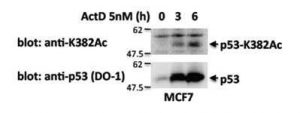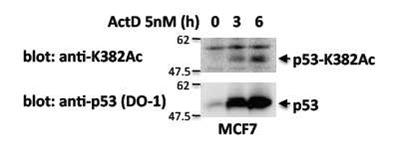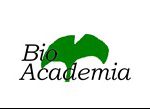Description
p53 mutants are found in more than half of human cancers and are considered as the most important human cancer related gene. p53 is detected at 53kD position by electrophoresis and is composed of 393 amino acids. In the unstressed normal cells, the p53 level is low and it is inactive. However, with stress, especially with DNA damage, it is activated to promote arrest of cell cycle and repair of DNA damage, or induction of apoptosis. The functions and stability of p53 are regulated by phosphorylation of serine and threonine, and acetylation of lysine at various sites in the molecule.
Acetylation of lysine 382 (acetyl-K382) of p53 occurs after DNA damage and is catalyzed by the p300/CBP acetyltransferase, which stabilizes p53 proten.
Applications
- Western blot (~1g/ml)
Specifications
Immunogen: Synthetic peptide containing acetyl-Lys382 of human p53
Specificity: Reacts with human p53 acetylated at Lys382. Other species have not been tested.
Isotype: Mouse IgG1 (κ)
Form: Purified IgG 1mg/ml in PBS (pH 7.4), 50% glycerol, sterilized by filtration
Storage: -20℃ (long period, -70℃)
Data Link
UniProtKB/Swiss-Prot P04637 (P53_HUMAN)
References: This product has been used for the following reference
- Bode AM & Dong Z “Post-translational modification of p53 in tumorigenesis” Nature Rev Cancer 4:793-805 (2004) PMID:15510160

Figure: Identification of p53 protein, whose Lys382 is acetylated, by Western blot with 2B7E4 antibody.
MCF7 cells in culture were treated with actinomycin D at 5 nM for the indicated periods and the cell extracts were analyzed by Western blot with anti-p53 acetyl-K382 antibody (2B7E4) and omnipotent anti-p53 antibody (DO-1). Acetylation of p53 at K382 was induced by the DNA damaging treatment



Reviews
There are no reviews yet.